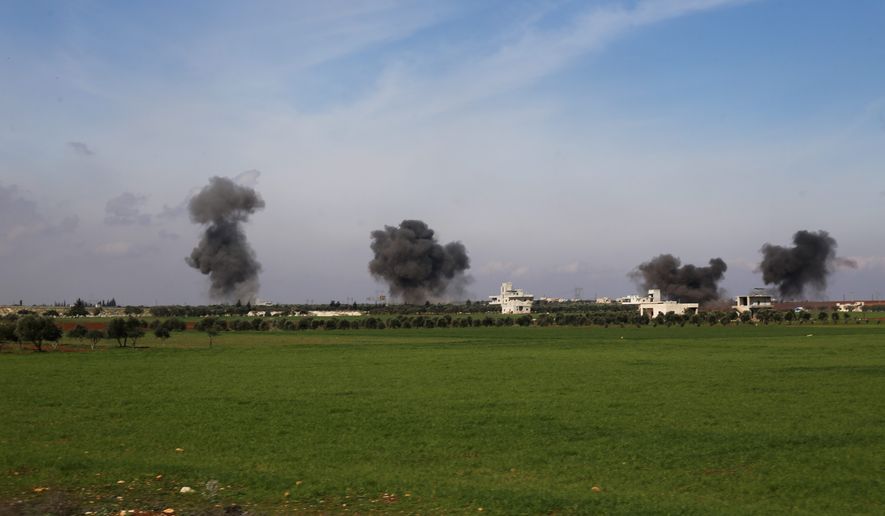A Syrian air strike Thursday reportedly killed nearly three dozen Turkish soldiers, a sharp escalation in a building conflict between the two countries that could soon result in full-scale war.
Rahmi Dogan, the governor of Turkey’s Hatay province bordering Syria’s Idlib region, said 22 troops were killed and others were seriously wounded in the attack late Thursday. Rebel-linked Syrian organizations later told the Reuters news service that some 34 Turkish troops died in the attack.
A Turkish government spokesman told reporters that “all known” Syrian government targets were under attack by Turkish air and land forces in response to the latest attacks.
Turkish President Recep Tayyip Erdogan, who has issued increasingly pointed threats to Syrian counterpart President Bashar Assad over the unrest on the border, convened an emergency security meeting in Ankara, the Anadolu news agency reported.
In addition to three Turkish soldiers killed in Idlib earlier Thursday, the casualties mark the largest death toll for Turkey in a single day since Ankara first intervened in Syria in 2016, according to the AP. At least 43 have now been killed in Idlib since the start of February.
After nearly a decade of civil war, Syrian forces, backed by Russia, have advanced aggressively against Turkish-backed rebels and jihadist groups in Idlib, the last major redoubt for anti-government forces. Turkey, which fears a worsening humanitarian refugee crisis spilling over into its territory, has warned Mr. Assad’s forces against pressing their offensive.
Analysts acknowledge Turkey, a NATO member, has significant advantages over its neighbor. It has a population almost four times as large — 82 million to 22 million — and has an annual budget of more than $18 billion compared to just over $3 billion by Syria, according to the website armedforces.eu.
Turkey has more jets and ships ready for combat and also has been a member of NATO since 1952.
“But Turkey is not as strong as it appears on paper,” said Michael Rubin, a resident scholar at the American Enterprise Institute.
A wholescale crackdown on Turkish military officers corps following a 2016 attempted coup against Mr. Erdogan has resulted in a fifth of all general and flag officers being sent to prison, Mr. Rubin said.
“Erdogan is looking for scapegoats because things are not going well,” Mr. Rubin said. “People with too much NATO experience in their careers also finding themselves subject to a purge.”
According to the armedforces.eu website, Syria does enjoy some military advantages over Turkey. It has more than 4,000 tanks — almost twice as many as Turkey — and more field artillery.
The human scale of the conflict is staggering. Officials with the United Nations say large scale humanitarian operations are underway as Secretary of Defense Mark Esper spoke by telephone with his Turkish Minister of Defense Hulusi Akar about the Idlib crisis. Ibrahim Kalin, a key foreign affairs aide to Mr. Erdogan, also spoke to National Security Adviser Robert O’Brien.
Meanwhile, Sen. Lindsey Graham called the violent Syrian incursion “one of the greatest humanitarian disasters in decades” and said he appreciated Turkey’s intervention into the Idlib province.
“It is now time for the international community to establish a ’no-fly’ zone to save thousands of innocent men, women and children from a horrible death,” the South Carolina Republican said.
Rebel forces, despite being pinned down in Idlib, have managed to put up a still fight. Opposition fighters retook a strategic northwestern town from government forces on Thursday, opposition activists said, cutting a key highway just days after the government reopened it for the first time since 2012, the AP reported, although Mr. Assad’s forces were taking more new villages in souther Idlib.
Mr. Rubin said the Syrian soldiers still loyal to President Assad are exhausted and drained.
“But they have a lot more experience at this point than the Turks do,” he said. “And they have their Russian advisers.”
• David R. Sands contributed to this story, which was based in part on wire service reports.
• Mike Glenn can be reached at mglenn@washingtontimes.com.




Please read our comment policy before commenting.